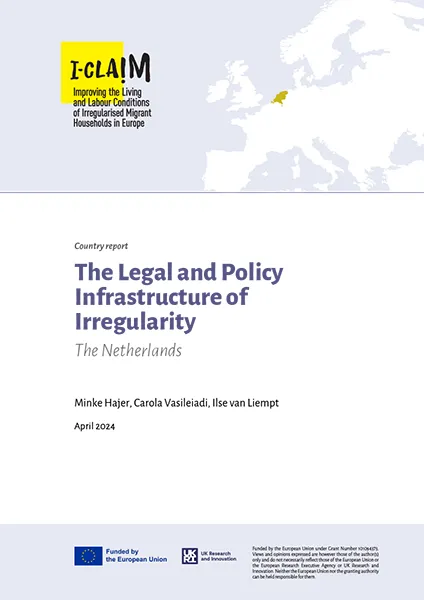The Legal and Policy Infrastructure of Irregularity: The Netherlands
Minke Hajer, Carola Vasileiadi, Ilse van Liempt
How to cite:
Hajer, M., Vasileiadi, C., & van Liempt, I. (2024). The Legal and Policy Infrastructure of Irregularity: Netherlands. I-CLAIM. DOI: https://doi.org/10.5281/zenodo.10966079
The Legal and Policy Infrastructure of Irregularity: The Netherlands
Minke Hajer, Carola Vasileiadi, Ilse van Liempt
The I-CLAIM project examines migrant irregularity in Europe, using the concept of ‘irregularity assemblage” to analyse interconnected factors shaping irregular conditions. This report focuses on Dutch policies, aiming to understand their implementation and impact on the production of migrant irregularity in the Netherlands. In the Netherlands, the most frequently used definition of an irregular migrant is ‘a person without a valid residence permit’, often referred to as ‘undocumented’ (‘ongedocumenteerd’). This group includes rejected asylum-seekers, migrants who came (irregularly) to work (irregularly) or people who have reunited with their families irregularly. Support organisations primarily focus on rejected asylum-seekers. Estimates suggest that there are between 23,000 and 58,000 irregular migrants in the country, with the numbers declining over the past 25 years due to policy changes and EU enlargements.
Over the past 25 years, Dutch policies have increasingly aimed to control migration flows, resulting in restrictive attitudes towards irregular migrants. The Koppelingswet (‘Linking Act’) of 1998 linked access to welfare services with legal status, thus excluding irregular migrants from essential services. The exclusion under the Koppelingswet affects not just irregular migrants but also mixed-status families and/or households. Despite some exceptions, irregular migrants have, since then, largely been excluded from social policies like financial benefits and housing subsidies. Moreover, by banning irregular migrants from the (formal) labour market, working has become increasingly difficult. The Koppelingswet exemplifies the shift towards internal control, excluding irregular migrants from the Dutch welfare state.
In the Netherlands, municipalities play a key role in executing national policies. Balancing national policy with local responsibilities, they often adopt a less-restrictive approach and can find ways to provide assistance despite national restrictions. Conflicting policies between national and local governments regarding shelter provision illustrate these challenges. A pilot project, the National Facility for Aliens (LVV: Landelijke Vreemdelingenvoorziening), aims to provide a sustainable solution for irregular migrants, involving collaboration between national and local governments, NGOs and the migrants themselves. However, tensions arise regarding the emphasis on voluntary return versus regularisation, highlighting the complexities of addressing irregular migration at different governmental levels.
The national policy discourse emphasises the increased exclusion of irregular migrants, yet this exclusion is nuanced in practice. Local governments and civil society often step in to provide support, challenging the straightforward narrative of exclusion.
